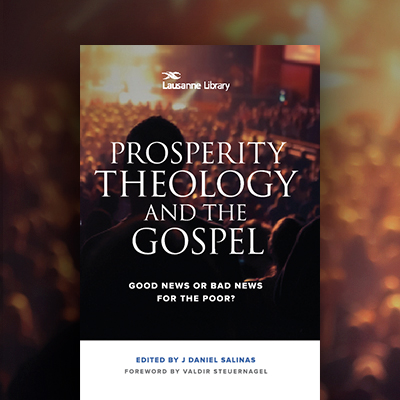You couldn’t miss Brazil’s preparations for the FIFA World Cup in 2014. They were a constant feature of the landscape as we drove from the airport in Sao Paulo to the town of Atibaia. Scaffolding was being erected, much painting was in process, and a clear sense of purpose filled the air.
We, too, a group made up largely of theologians and missiologists, gathered from all continents, shared a sense of purpose. Our hope was to engage deeply with the ‘different gospel’ that has undermined the true gospel in many churches. One fruit of our gathering would be a book. Its publication took time, but now we offer to the church what I believe may be the most thorough book on this subject to date.
What, then, is this ‘different gospel’? It is widely-known as ‘prosperity theology’. Its teaching has parodied biblical teaching on the character of God, and created a new brand of ‘discipleship’, not known in Scripture. Its influence—promising so much—has caused untold harm. Leading up to the Third Lausanne Congress, I was working with Christianity Today on a series of articles and videos addressing critical issues in the church. The article on prosperity theology was one of the most-read.
Where did this ‘gospel’ come from? While it holds in its grip many thousands whose lives lack material stability, it did not spring out of poor churches. The Nigerian mission leader, Femi Adeleye, a long-time colleague and friend from my years in IFES, brought a commanding overview and assessment of prosperity teaching. He showed how this teaching was, in fact, first exported from the West. We were then led thoughtfully through the theological, historical, and ethical dimensions of prosperity teaching.
It is important to note that there can be no condemning of prosperity itself. The group in Atibaia recognized a clear ‘theology of prosperity’ running through Scripture. Think, for example, of Abraham, David, and Solomon, men blessed with much material wealth, as of course Job had been. Indeed, the creation of wealth should be regarded as a Christian mandate, for the good of society. This, however, was not the brief for our work in Atibaia.
I am now able to commend to you Prosperity Theology and the Gospel: Good News or Bad News for the Poor?—a thorough, lucid, accessible, and, we trust, seminal book. Let’s be good stewards of what it offers.
As with all Lausanne books, we include study questions at the end of chapters. This could easily be used in church groups or workplace fellowship groups. The Atibaia Statement draws the threads of the book together. In its Conclusion, Femi Adeleye and Valdir Steuernagel take the four ‘calls’ of the statement and offer pointers for the church—the local church. Yours or mine.
Prosperity Theology and the Gospel(edited by Daniel J Salinas) is published by Hendrickson Publishers / The Lausanne Library. ISBN 978 1 68307 049 8.


